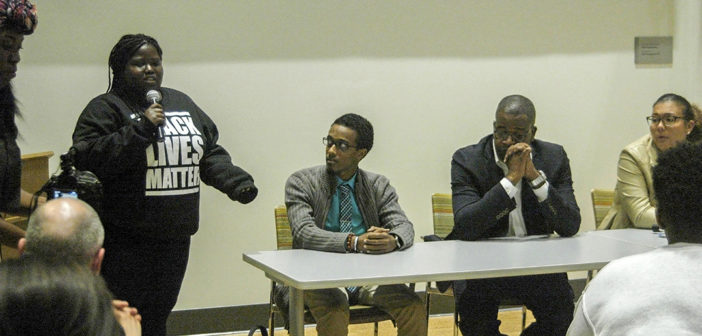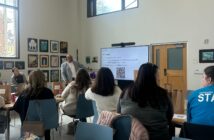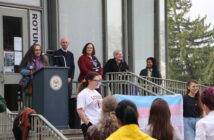Gwladys Boukpessi, ’18, remembers walking down the street with her brother many times during her childhood. More often than not, those walks ended with her calling for help because her brother, who has epilepsy, was having another seizure.
She described her brother as sweet and non-threatening.
Boukpessi said when she read the Sept. 27 headlines about the police shooting in El Cajon, California, she thought about how her brother could’ve been the black man who had a mental illness and was shot and killed by police. She said she also remembers thinking she could’ve been the man’s sister, who dialed 911 to call for help when her brother was acting “erratically,” unknowingly endangering both him and others.
If she didn’t feel like she could call the police when her brother needed help, Boukpessi asked, then who could she call?
Boukpessi was among the students, faculty and staff members who attended the open forum on protest and policing in the U.S. held last Wednesday in Williams Hall. Attendees lined the balcony above the main meeting space and spilled out of the packed room into the hallway.
Stories of shootings and killings of unarmed black civilians by police officers have been continuously going viral through the circulation of videos and hashtags, the most common of which is the Black Lives Matter movement.
Boukpessi said she attended the forum because she thinks it’s important to have these kinds of conversations, especially when faculty members are leading them. She said it shows that people care, they’re aware of the issues in the community and they want to help bring about change.
James Peterson, an associate professor of English and the director of Africana studies, began the forum by saying it was only the beginning of the discussion and that change doesn’t happen overnight.
Peterson said it wasn’t an anti-police forum but an anti-police brutality forum. He said police brutality leads to the deaths of unarmed white civilians as well, despite the focus on unarmed black civilians.
The panel was facilitated by Peterson; Sirry Alang, an assistant professor of sociology, anthropology, and health, medicine and society; Holona Ochs, an associate professor in the political science department; and Saladin Ambar, an associate professor and the chair of the political science department.
The conversation lasted for about two hours and was fueled by applause, which sometimes evolved into standing ovations, cheers, laughter and tears. The forum revolved around stories, questions and discussions.
Peterson said the idea to hold a campus discussion was inspired by emails he received from students after the shooting of a black man in Tulsa, Oklahoma, by police. He said students come to him because they know he writes and comments about these sorts of issues in the media, so he is willing to both talk to and reflect with students.
Alang came to Peterson about the Tulsa shooting and said she couldn’t sleep after watching the video. Peterson said it was “striking.”
Peterson said that’s when he realized the matter needed to be addressed immediately.
Alang said the shooting showed her that not every human life is created equal, and that black lives are too often viewed as disposable. She said she hasn’t seen any justice, only repeated deaths.
One of her students contacted her at 2 a.m. after the death. Another, a black commuter student, feared for his life because these shootings tend to happen on the road, and he didn’t want to become another hashtag.
Alang said she wanted to tell the student it wouldn’t happen to him, but couldn’t — because, realistically, there is always a chance it could happen.
Alang said talking and listening to others makes her feel less powerless, so the idea of a forum appealed to her.
When lives are on the line, Alang said, we can either choose to speak or to perish.
Peterson said at institutions of higher learning, students see these kinds of things happening and want to do something about them. They don’t want to live in a world where unarmed civilians are murdered by law enforcement because of traffic stops, broken-down cars or because they’re having an episode due to a mental illness.
Peterson has met with President John Simon throughout the semester to try to think of opportunities for the community to have a dialogue around such issues like these. He said Simon challenged him to be on the lookout for those opportunities.
Lehigh has a responsibility to address these kinds of issues, Peterson said, because the school is home to a lot of smart and bright young students who will someday be leaders and have the chance to change the world.
“I think it’s pretty clear that this is a national problem, that there is an absence of trust between the community and law enforcement,” Peterson said. “There is a fairly challenging problem around biases and judgment and profiling and stereotyping that is in this sort of institutional framework of our criminal justice system and certainly in our law enforcement system as well.”
He said some of these communities — like Charlotte, North Carolina — have been dealing with these kinds of issues for a long time now.
He said one of the first steps is to challenge our communities to be proactive and think critically, as well as raise awareness and ask questions about this important social justice issue.
Alang said while Lehigh alone won’t change racial dynamics in the U.S., the importance of awareness can’t be downplayed.
“There is an awareness gap,” Peterson said. “There are plenty of communities across this nation that don’t have to deal with the same kind of law enforcement issues that poorer communities and communities of color have to deal with.”
It’s important to focus not on individual law enforcement officers, Peterson said, but on the institutions that produce them. He said substantive policy remedies need to be made, including establishing civilian review boards to oversee cases, reforming how we police, focusing on de-escalation and on peace makers rather than “warrior cops,” and potentially empowering officers without arming them to make the system safer.
“We need people who are going to get medals for diffusing a conflict as opposed to resolving it with violence,” he said.
Two of the main discussion topics focused on whether or not to share videos of police brutality and what actions can be taken on campus to raise awareness and inspire change.
While some panelists expressed a lack of willingness to participate in the consumption of videos that portray black deaths, Peterson said some families want videos of their deceased loved ones to circulate throughout the Internet because families wouldn’t be able to raise awareness or seek justice in any other way.
A few black audience members said the stories of the deaths of black civilians across the country could have easily been their own. Several black professors said while they are viewed as professors in the classroom, they have to fear for their lives outside of the classroom because they are only seen as being black.
Peterson said while there were many key people missing from the forum, there were enough people that attended who could spark a change.
Boukpessi described the forum as powerful. She said though it’s important to have these kind of forums, there needs to be more than just a conversation. She encouraged everyone to become actively involved, rather than be bystanders, and to take advantage of the opportunities they have, rather than choose silence.
Boukpessi said she isn’t going to stop fighting for who or what she is. What happened in the past cannot continue to happen, she said.
Alang said she liked Lehigh more after the forum because the community didn’t choose to take the quiet route like many other schools do. She said the turnout and stories of both black and white students and staff were meaningful.
Alang said her wish is to get to a point where society values black lives, and it starts with the future leaders at Lehigh.
“I hope (the shooting of an unarmed civilian) doesn’t have to happen on our campus or in our neighborhood for us to be concerned about it,” Peterson said. “I hope that (the forum) will make our community stronger by folks coming to terms with the simple idea that at Lehigh, we’re going to be stronger if we engage these challenges directly.”






Comment policy
Comments posted to The Brown and White website are reviewed by a moderator before being approved. Incendiary speech or harassing language, including comments targeted at individuals, may be deemed unacceptable and not published. Spam and other soliciting will also be declined.
The Brown and White also reserves the right to not publish entirely anonymous comments.
1 Comment
I have said this for years, if America truly want police reform, we must first get rid of the organization that protects them. President Regan fired and replaced the air traffic controllers with the military. What mayor’s in to do is what Regan did and replace police with National Guards.